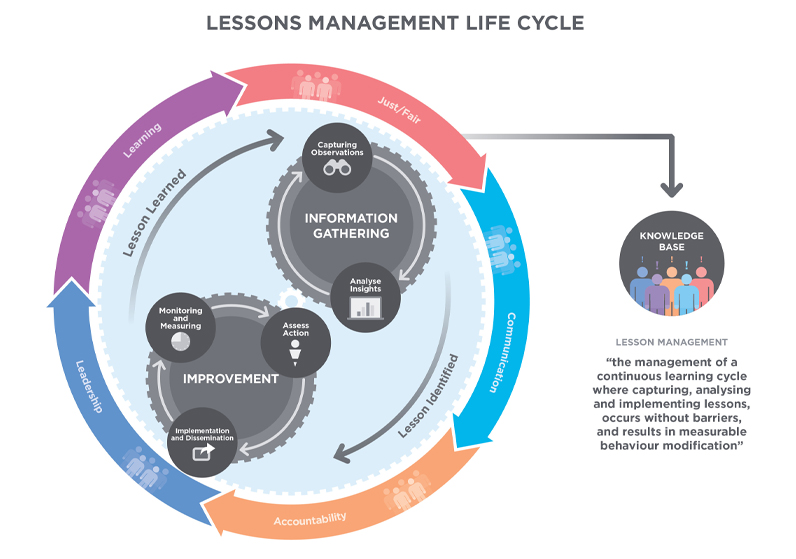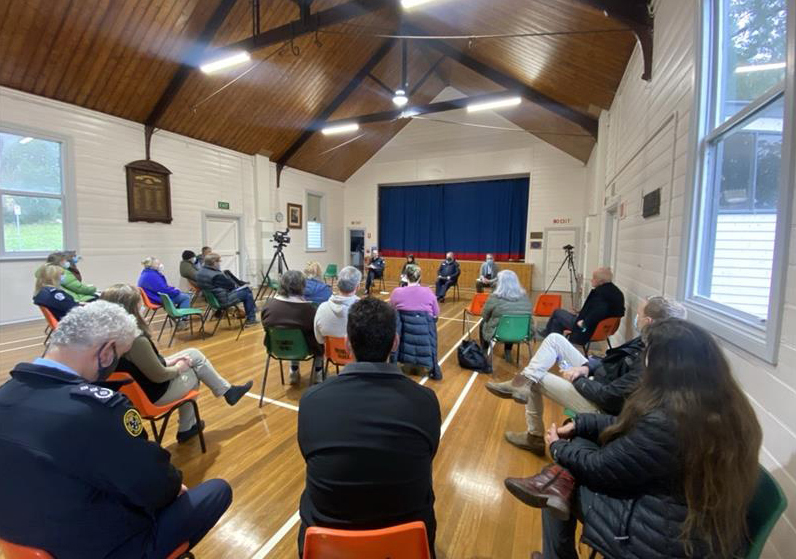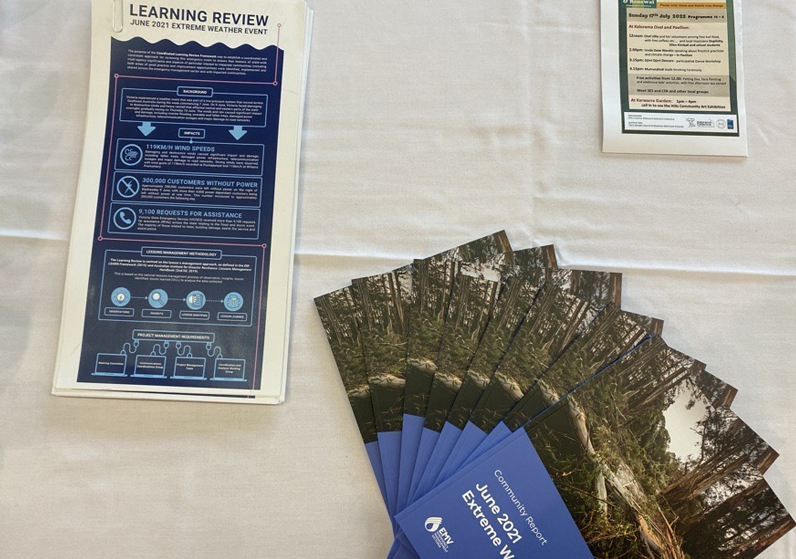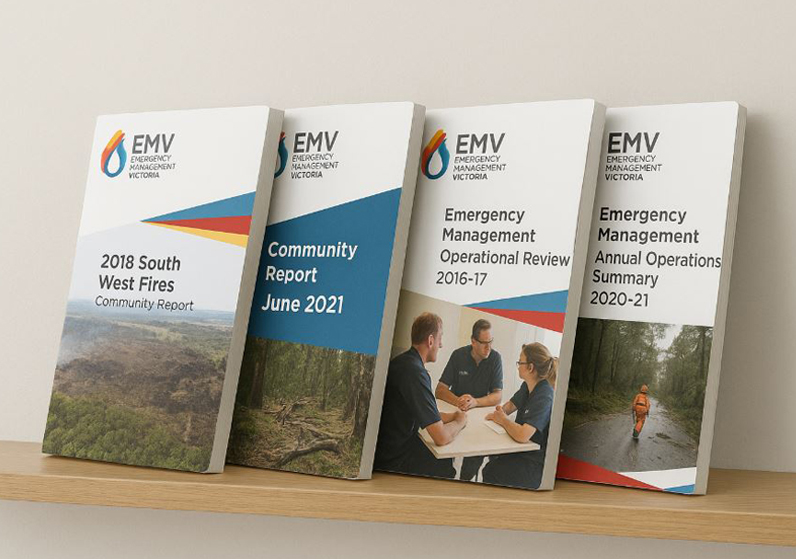Victoria’s focus on multi-agency collaboration to ensure lessons can be identified, shared and learnt has been, and continues to be, integral to the implementation of an effective lessons management approach.
In 2014, the Inspector-General for Emergency Management (IGEM) published the 2013-14 Fire Season Compliance Report1 that recommended that ‘Emergency Management Victoria (EMV), in consultation with the emergency management (EM) sector, continue the development and implementation of a formal lessons management system that applies to all hazards’. As a result, Victoria’s first sector-wide emergency management lessons management framework, EM-LEARN2, was released in November 2015. The EM-LEARN Framework established a model for lessons management, incorporating a life cycle that defined cultural characteristics and a lessons management process (see Figure 1). This model was developed through an environmental scan of local, national and international lessons management good practices, along with research on successful lessons management approaches in emergency management.3
Since its release, the EM-LEARN Framework has supported Victoria to learn from a significant number of emergencies. During this time, the emergency management sector has identified areas for improvement and opportunities to sustain good practice to support learning and continuous improvement. In particular, Victorian emergency management agencies have taken a collaborative approach to embed consistent lessons management governance, communication, doctrine, capability development and technology to facilitate an effective implementation of the EM-LEARN Framework.
The journey for continuous improvement is ever evolving with the increasing frequency and severity of emergencies. Therefore, this is an opportunity to provide an update on Victoria’s journey and highlight some of the key achievements a multi-agency centred approach can support when implementing a lessons management framework.

Figure 1: Victoria's lessons management life cycle is based on research and defines cultural characteristics and the lessons management process.
Embed lessons management in multi-agency governance structures
Over the past 10 years, the State Review Team (SRT) has been the constant point of collaboration and consistency in lessons management by overseeing and maintaining strategic effectiveness of a common lessons management approach. This governance committee continues to support the implementation of lessons management across the emergency management sector through sharing, collaborating and identifying state-level and multi-agency trends to inform ongoing continuous improvement activities before, during and after emergencies. With 24 agencies and department representatives from across the emergency management sector (both national and state), the SRT:
- meets regularly to discuss lessons management, including updates on agency activities (for example debriefing, monitoring, exercising and reviewing activities)
- considers opportunities to collaborate and improve the way the sector works together, manages emergencies and learns from emergencies
- uses learnings to inform sector-wide improvements and contribute to a culture of continuous improvement.
The SRT was formalised as a committee under the State Emergency Management Plan4 (SEMP)a in 2020 with the integration of lessons management activities outlined in individual agency role statements. These lessons management activities align to the Victorian Preparedness Framework5 (VPF) Assurance and Learning core capability, one of Victoria’s 21 core capabilities and subsequent critical tasks that set the foundation for how Victoria effectively mitigates, plans and prepares for, responds to and recovers from major emergencies. The Assurance and Learning core capability ‘supports continuous improvement to improve emergency management practice and community safety by extracting understanding from experience and research, reviewing community consequences, investigating causes and outcomes, providing assurance and translating lessons into behaviour change’.6
As the Victorian emergency management sector matures in lessons management, agencies are developing and implementing their own agency lessons management frameworks in line with the EM-LEARN Framework, the Australian Institute of Disaster Resilience (AIDR) Lessons Management Handbook7 and their SEMP responsibilities. The SRT, as the main collaboration point, further supports and promotes the embedding of a common lessons management approach through sector-wide consistency in lessons management practice and effective and coordinated learning and continuous improvement.
Ensure lessons management is a key component of community-facing communication pathways
A range of communication methods and products are used in Victoria to enable lessons to be shared and inform continuous improvement before, during and after emergencies. At the regional level, Regional Environmental Scans8 are available to assist Regional Emergency Management Planning Committees in their planning activities, including to review of including the review of regional emergency management plans and to inform the Regional Emergency Risk Assessment process. The scans include a dedicated lessons management section highlighting insights drawn from learnings captured from 2022–24.
During operational activity, there are a range of products that are available to the sector to support real time learning and improvement:
- Before Action Reports (a summary of learnings from previous events and research based on themes and trends that may be useful for personnel involved in operational activity).
- Operational Learnings Reports (an ad hoc report summarising learnings from previous events that are provided on request from personnel involved in operational activity).
- Real Time Monitoring and Evaluation (RTM&E) Deployment Reports (a summary of insights from recent RTM&E deployments).
Post-event learning has been a particular focus area over the past decade to enable multi-agency lessons to be identified and communicated to the sector and community to inform continuous improvement through products such as Emergency Management Operations Summaries9 and operational reviews.10 In particular, major emergencies such as the June 2021 Extreme Weather Event11 and 2018 South West Fires12 resulted in extensive post-event review processes and the development of public-facing community reports to communicate critical lessons relevant to the community.
Together, these lessons management products allow for the timely distribution of learnings and also help embed a learning culture across the emergency management sector through key supportive doctrine.


One of the June 2021 Extreme Weather Event Community Report community engagement sessions and materials.
Images: Emergency Management Victoria
Build lessons management processes into operational practices
The Victorian emergency management sector has been embedding lessons management processes into operations. During 2015–16, the concept of an operational lessons management function was piloted at the Victorian State Control Centre (SCC). This function was initially called ‘Investigation and Learning’ as an expansion the Australian Inter-service Incident Management System Investigation function to include lessons management operational activities. Its purpose was to provide guidance and coordination to the State Response Controller and Emergency Management Commissioner on the delivery of operational lessons management activities.
Following the pilot’s success, an Assurance and Learning function was established during 2016–17. At the same time, it was identified that there were multiple real time monitoring and real time evaluation activities being carried out independently by different agencies resulting in confusion across the sector. A formal review was undertaken during 2016–17 and a hybrid model called Real Time Monitoring and Evaluation was implemented in 2017–18 after extensive sector consultation. Victoria’s RTM&E capability is defined as ‘a systematic and objective function that monitors operational performance of systems and processes and evaluates the effectiveness of emergency management activities’.13
In response to the significant lessons management activities that occurred after the 2019–20 summer bushfires and COVID-19 pandemic, the Assurance and Learning function was refreshed in 2021–22 and renamed State Lessons and Evaluation. This change reflected the function’s evolving role and the formal integration of RTM&E as a core capability used for capturing, sharing and learning in real time.
Since the framework's release, Victoria's State Lessons and Evaluation has become embedded in the SCC, activating multi-agency surge personnel alongside dedicated staff so that lessons are integrated into preparedness, response and recovery activities.
In addition, the value of RTM&E is recognised with the capability being deployed nearly 30 times to capture and share real-time learning at the incident, region and state tiers.
Focus on building lessons management capability across the sector
Building lessons management capability across the sector has been, and continues to be, one of the main focus areas for EMV and the SRT. Strengthening this capability ensures that agencies and teams have the skills, tools and support they need to effectively identify and learn lessons. In collaboration with the SRT, a range of capability development courses has been created that support a range of training needs, both in-person and online. One of the most in-demand courses is the Debriefing Facilitation and Lessons Management Course facilitated by the SRT. The purpose of this course is to develop or refresh participant understanding of debrief planning, facilitation and conduct as well as implementation of debrief outcomes in line with the EM-LEARN Framework and lessons management methodology. Importantly, it is enabling the sector to build a pool of skilled debrief facilitators that agencies and teams can access when they require that expertise.
Additional in-person training includes:
- RTM&E training: expanding the pool of personnel to support that operational capability
- State Lessons and Evaluation Functional Unit training: developing a surge pool to support the function at the SCC
- WeLearn Culture training: building a strong foundation for embedding lessons management and continuous improvement within teams and agencies.
As Victoria’s lessons management capability and capacity grows, so too does the commitment to refining and enhancing training offerings. Following the IGEM Inquiry into the 2019–20 Victorian Fire Season,14 a dedicated uplift project was undertaken to strengthen the RTM&E capability. As a result, a range of online training modules, including video case studies, were developed to support lessons management capability building and the learning of lessons identified.
Victoria has also contributed to the development of a national lessons management online module, designed to support the national implementation of consistent lessons management methodology in line with the Lessons Management handbook. All training modules are available to the Victorian emergency management sector through the multi-agency EM-Learning platform.
Use technology to support lessons management analysis and sharing of learnings
EM-Share15 is Victoria’s online lessons management outcomes repository that enables the emergency management sector to:
- share observations and files from operational and non-operational activities
- view insights and lessons
- track actions to embed learnings and facilitate continuous improvement of the sector.
Over the past decade of conducting lessons management activities and managing a significant number of observations, insights and lessons, learning has occurred on how best to use a lessons management database. One learning in particular relates to the need to differentiate between ‘multi-agency’ and ‘agency-specific’ learnings, specifically in managing the implementation of lessons identified to ensure they result in meaningful change.
EM-Share holds more than 35,000 multi-agency observations that have been analysed into nearly 4,000 insights and over 200 lessons. However, what isn’t easily quantifiable is the amount of work undertaken by the SRT to support the development and implementation of enhanced EM-Share functionality, including:
- lessons implementation reporting
- expanding action tracking options
- new agency-specific functionality, to allow agencies to use EM-Share as their own management system.
This functionality has given organisations greater control of when and how to share learnings with the broader sector while ensuring a consistent approach in the way lessons management outcomes are managed and shared.
Evolving lessons management practice and implementation
While significant progress has been made in lessons management implementation over the past decade, there is always more to be done to respond to current and emerging challenges. As concurrent emergencies and climate change effects communities, there is less time to pause, reflect and conduct extensive improvement practices. As a result, the future of continuous improvement will need to adapt and evolve. An important element to facilitate this is multi-agency collaboration within Victoria, nationally and internationally to ensure trust and confidence in continuous improvement practices. Strengthening a shared-learning culture requires ongoing investment in lessons management understanding, capacity and capability to ensure we drive improvement more effectively and purposefully across the sector into the future.



